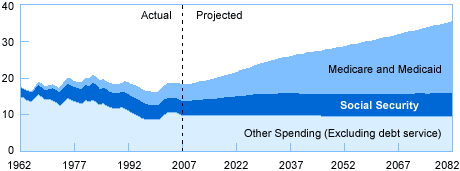Should we spend more to stimulate the economy? Or spend less because runaway debt is threatening our fiscal health? Ezra Klein comments:
Few economists, I think, would argue against the combination of short-term spending and longer-term deficit reduction if they believed the deficit reduction was certain. But the American political system has a lot of trouble making unpopular choices and some trouble sticking to those choices once they’re made.
This is where you might expect a bloc of deficit hawks to step into the middle of the legislative debate with a proposal pairing spending in 2011 with savings beginning in 2014, but we’ve seen no such thing.
I think I’d put this differently: there is no bloc of deficit hawks. End of story. There are a few individuals here and there who are sincere about cutting the deficit, but a bloc? Not even close. They’re almost all posers.
But Kevin, you say, how can you know this? Can you read the minds of men and women three thousand miles away? Actually, no — though it would be pretty cool if I could. But in this case I can do something almost as good: I can look at the public evidence. And that evidence is crystal clear: there are lots of members of Congress who are willing to talk endlessly about deficits, but there are very, very few who are willing to publicly support specific cuts. There are fewer still who are willing to publicly support cuts that might affect any of their own constituents. And there are fewer still  who have shown any inclination to actually vote for serious cuts when they’ve had the power to do so. So: no bloc of deficit hawks.
who have shown any inclination to actually vote for serious cuts when they’ve had the power to do so. So: no bloc of deficit hawks.
Still not convinced? Well, Ezra is right that America’s political system (like every other democracy’s) has a lot of trouble making unpopular choices, but it’s not entirely impossible to stick to spending cuts and tax increases once they’ve been made. It’s true that anything one Congress does, another can undo. But the fact is that tax increases have been phased in over time in the past, and the phase-ins have taken effect. Likewise, entitlement cuts have been phased in over time, and those cuts have taken effect. Not always, but a lot of the time. If Congress actually had the will to legislate Medicare and Social Security cuts that phased in over ten years starting in, say, 2013, there’s a very strong likelihood that the cuts would happen. The 1983 Social Security compromise, for example, gradually raised the retirement age over a span of two decades starting in 2003, and that has taken place exactly on schedule.
Really, the only serious issue is actually doing it, not having faith that the cuts will actually happen. Discretionary cuts are very difficult to promise credibly, but entitlements have always worked largely on autopilot once the rules are set. If there were genuinely a bloc of deficit hawks in Congress, they’d be willing to vote for both Medicare cuts and tax increases that phase in over a period of years. But almost none of the supposed deficit hawks are willing to do either of these things, let alone both. They’re posers.

















